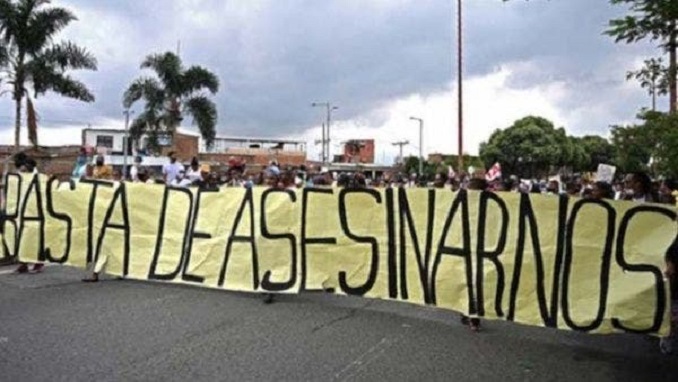Five hooded men armed with long-range weapons intimidated the victims, whose bodies show signs of torture, gunshots, and stab wounds, teleSur reports. Colombia’s Defense Minister Diego Molano on Wednesday reported that at least five coffee pickers were killed and one man was wounded in an armed attack in the Antioquia Department.
“The attack occurred on Tuesday around 21h00 local time on a coffee farm in the La Ermita village,” Molano explained, adding that local authorities are identifying the victims.
A survivor told local outlets that five hooded men armed with long-range weapons intimidated the farmers and locked them in a room to shoot them. The corpses show signs of torture, gunshots, and stab wounds. The injured, who was transferred to a medical center, is in critical health condition.
Local police officers are deployed at the scene to investigate the facts. Preliminary data show that the massacre’s motive may have been territorial issues related to drug trafficking in the Taparto municipality.
“It seems the killers were inquiring with the victims about the location of the drugs that were to be commercialized in that municipality,” the police stated.
The reasons for the attack in the town of Andes in Antioquia department were unknown, but the area is under the control of a paramilitary drug-trafficking gang called the Gulf Clan, known for conflicts with rivals over smuggling routes.
It is the latest in a string of such massacres — attacks resulting in three or more deaths on the definition of the UN — in recent months. Since the beginning of the year, 22 people have been killed in the Andes municipality, a territory controlled by ‘Gulf Clan’, ‘La Guadalupe’, and ‘Las Terrazas’ criminal gangs.
In December, the UN said armed groups had carried out 66 massacres across Colombia in 2020, in which 255 people died. Local organization Indepaz puts the number at 91 massacres.
Antioquia is the department hardest hit by the wave of killings — the worst since a 2016 peace deal that ended decades of civil war and reduced levels of violence in a traumatized society. This year so far, there have been four such attacks in Antioquia — a third of the national total.
Last November, five coffee growers and three other people were killed in an overnight attack on a farm in the Antioquia town of Betania. The government blames groups that finance drug trafficking and illegal gold mining for the resurgence in killings.
Added to 2020’s violent toll, 120 human rights defenders were killed, according to the UN, which said 244 former FARC fighters have also been murdered since the 2016 deal. The Gulf Clan controls the bulk of Colombia’s cocaine production and uses violence and intimidation to control narcotics trafficking routes, cocaine processing laboratories and departure points.
